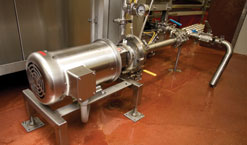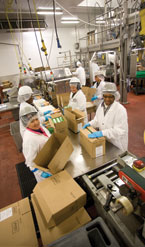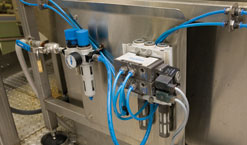
Sea-change evolution
By George Guidoni, Editor
Automation Converting Sustainability Converting Fabrication Sustainability frozen food packaging Janes Family Foods Ltd.Leading Canadian frozen-foods processor helping to stem the tide of ocean resource depletion with fair fishing practices and certified, eco-sensitive consumer packaging
There is an ominous man-made perfect storm raging across the world’s overdepleted and overpolluted oceans, but until recently most Canadian consumers have been blissfully unaware of just how calamitous worldwide overfishing and marine degradation have been to the once-bountiful food source normally taken for granted in a nation blessed with vast coastal exposure to three of the world’s five oceans.
Tom Janes is determined to put an end to that cozy ignorance and indifference in a hurry—well before the world’s fast-vanishing commercial fishstocks begin to disappear in their entirety.

The entire Janes retail seafood product portfolio is packed in 100-percent recycled folding cartons made from GreenChoice 100 paperboard produced by Strathcona Paper and converted by Boehmer Box LP.
And time is not really on the side of the director of sustainability with the Toronto-based Janes Family Foods Ltd.—a thriving, family-owned fish and poultry processing business founded by his Estonian-born father, Lem Janes Sr., shortly after arriving in Canada from Sweden after World War II.
Following stopovers in Halifax, Newfoundland and Montreal, the Janes family eventually settled in Toronto in 1969, where Lem Janes, a professional food technician by trade, laid foundations for a steadily expanding frozen foods processor now routinely generating annual revenues of well over $100 million.
Raised in a loving family environment placing high value on work ethic and deep respect for the environment, Tom Janes says he has a natural life-long affection for the sea—partly due to the family’s Baltic heritage and his own experience of growing up in Newfoundland—which gives him a strong sense of personal fulfillment in drawing attention to the tragic plight of the world’s fishstocks and marine habitat.
Earlier this year, the company sponsored a national survey, conducted by Leger Marketing, which revealed the extent to which Canadian consumers are relatively untroubled by the fact that an estimated one-third of the world’s fish and seafood species have collapsed, with the catches declining by at least 90 per cent.
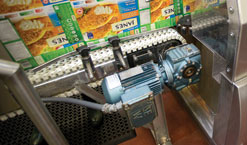
Powered by a heavy-duty SEW-Eurodrive motor (foreground), a Bradman Lake cartoner opens up folding cartons for inserting bags of frozen fish fillets inside.
Released at the local World Ocean Day celebration also sponsored by the company, the Leger survey found that only one in 10 Canadian consumers consider sustainability as a factor affecting their choice when buying seafood at a grocery store or restaurant, with 59 per cent citing taste and 55 per cent picking price as their key motivators.
“We had a hunch that there is low public awareness facing our oceans today, and sadly the results confirm our suspicions,” says Janes, whose family personally witnessed the impact of the collapse of cod stocks in Newfoundland due to overfishing.
“Scientists estimate that as much as 75 per cent of the world’s fishstocks are overfished,” he adds, explaining his company’s recent embrace of the sustainable seafood certification and eco-labeling program developed by the Marine Stewardship Council (MSC)—resulting in a comprehensive redesign of the folding cartons used to package the company’s popular frozen fish products to include both the MSC label and valuable education consumer information on seafood sustainability.
Says Janes: “It is important for us to realize that each of us can help protect the world’s oceans from overfishing by choosing certified sustainable seafood when grocery shopping, and by not ordering endangered seafood at restaurants.
Broad Reach
Janes says he hopes to use the company’s geographic reach—the new MSC-labeled Janes fish packs are retailed right cross the country through Metro, Loblaws, Walmart and other national and local grocery stores—will increase public awareness of the scale of the problem, as well as the fact that only one per cent of the world’s oceans are protected as marine reserves, making the rest freely open to all sorts of commercial fleets with dubious fishing and netting practices.
As much as this frustrates Janes, it also gives him extra motivation to champion the cause of responsible marine stewardship, he relates.
“I wish we were able to have all of our catch come in from Canadian waters, but there is simply no longer enough fish there for us to sustain the business,” Janes told Canadian Packaging on a recent visit to the company’s fish processing and packaging operation just north of Toronto in Concord, Ont., which receives its fillets of sole, code and haddock caught in the far-off Bering and Northern Seas.
The highly sanitary, fully HACCP (Hazard Analysis Critical Control Points)-certified, federally-inspected facility processes and packages its various hand-cut fillets in a smooth-running, two-shift daily operation to produce the four premium-quality, pub-style breaded fillets marketed under the Janes Lemon and Herb Fillet of Sole, Janes Lemon Pepper Cod, Janes Lemon Pepper Sole and Janes Premium Haddock labels.
“The fact that all our product is processed as hand-cut fillets definitely give us a big quality edge over many competing frozen-fish products out in the marketplace, who basically just compress loose pieces and bits of fish into a mass, which is then cut into portions from one big block,” he explains. “Our method is far superior in providing consumers with a far more authentic and tastier seafood experience.
“It is a also a much healthier alternative because it is all processed and prepared specifically for baking, rather than deep-frying, using no transfats, very low saturated fat content, and no hydrogenated oils or preservatives,” adds Janes, who returned to the family business a couple of years ago after a five-year foray into the teaching world.
“When I came back to the company,” he recalls, “I really focused on how to enhance our company’s seafood business.
“It seems that while I was on my leave-of-absence, we focused so much on enhancing our chicken business that we slipped in the sales of our seafood products, where we actually used to be the Cadillac of the industry,” he expands. “We actually had created the entire product category back in the day with our frozen seafood, but it seemed that we then just sort of sat on our laurels and did nothing to grow the business in a substantial way.
“So as we went trough the entire product portfolio, justifying some and canning others that were just not right for our brand, we discovered that the entire supply of seafood worldwide is in very serious jeopardy,” says Janes, recalling how supply sustainability completely dominated the agenda of the International Boston Seafood Show 2010 exhibition he attended last year.
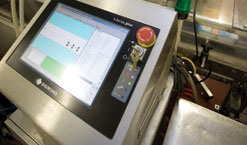
The Domino S-Series Plus laser coder is used to generate permanent product codes right on the packaging substrates.
“That’s when the light switch just went on for me and for us as a company,” he recounts. “I thought right away: What would it take for a relatively small company like ours to make that real commitment to sustainability?
“So we came back from Boston and started asking all those questions: Could we get the supply of fish we needed? What would it take for MSC to come in and approve us? How could we market that approval to relate its significance to the Canadian consumers?
“And here we are 11 months later, with all of our seafood product being MSC-approved and MSC-labeled,” beams Janes. “We really believe that in time MSC will be one of the most commonplace NGO (nongovernmental organization) symbols that you will see on packages in Canada, and we are very proud to be the first seafood producer to do it here.”
While there are other eco-labels available for global fish producers to mark their products as sustainable, Janes acknowledges, “we thought it would just confuse the consumers if we tried other certifications.
“To put it simply, MSC is the furthest-advanced and the most credible NGO in this field, with the methods they use to audit fisheries system being universally accepted around the world,” he states, relating that Janes started applying the blue-and-white MSC Certified Sustainable Seafood labels and symbol onto the upper-right corners of its 580- and 590-gram folding-carton boxes this past spring.
“We simply couldn’t do it until making certain that we could secure adequate supply of certified fish first,” he says.
Long Road
“It was a fairly long and intensive auditing process,” recalls director of manufacturing Morgan Curran-Blaney. “We had to go from getting our suppliers certified and then working up all the way to our operations to ensure we are all MSC-approved.
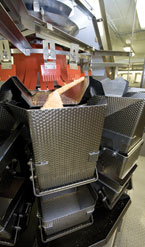
A multibucket Ishida scaling system dispenses precise amounts of breaded fish fillets down into the Pacmac bagger positioned below.
“There’s no turning back after that: once you’ve run out of [certified] fish, you can’t just start putting other regular fish into the box,” he says.
“And of course we had do so for all the five species of fish that we use here,” points out Janes, “including cod, pollock, haddock, sole and salmon, which we’re launching as a salmon-burger type of product.”
While the MSC certification process has raised sustainability awareness to whole new level throughout Janes operations, the company’s genuine commitment to meaningful CSR (corporate and social responsibility) traces back much farther in time, according to Janes.
“As a company we have always been a very environmentally-conscious enterprise—going back to 1992 when we launched our first retail packaging products in Canada,” Janes relates. “It was around the same time that the government of Ontario was announcing and introducing all sorts of new waste-reduction measures, many of which unfortunately got cancelled eventually.
“But when we launched our first retail-packaged products, we went through great efforts and hard work to make sure that our paperboard boxes were not chlorine-bleached, and that they would also be recyclable.
“We worked quite hard on developing a box that would house our products while fully satisfying those environmental concerns,” says Janes, noting those early efforts were extremely useful in positioning Janes as an established leader in corporate environmental stewardship today just as many of its competitors are trying to jump on the sustainability bandwagon to catch up.
“As a company you’re always looking to operate well by always looking at the process in terms of continuous improvement,” Janes says, “which means having less waste in terms of garbage to dispose of, saving energy where you can, saving water and so on.
Curran-Blaney concurs: “It is all about good business, and the nice thing about sustainability is that it all ties in very nicely with cost-savings.

A Fortress metal detection system is used to ensure optimal quality assurance for fish products processed and packed at the Concord facility.
“It’s simply good business not to waste things like energy, raw materials, or packaging supplies in the way you manufacture, distribute and market your products,” he states.
Adds Janes Family Foods product manager Jackie Phillip: “According to MSC, 75 per cent of the world’s fishstocks are either overfished or depleted, and based on those figures scientists predict that if we continue on the same path of not caring about what kind of fish we purchase and consume, there will be a complete global fisheries collapse in less than 50 years.
“So while consumers may not be aware of the crisis to the extent that we are, we feel it is vitally important for us to make them aware of it, with packaging being a very good medium for us to spread that awareness in the marketplace,” she says.
“The presence of the MSC label our packaging helps assure consumers that the people who are fishing our product for us are doing it responsibly, meaning that they are not doing damage to the ocean or to the other species, while also using a net size that allows the smaller-sized fish to escape, thereby ensuring that there will be a continued supply of this species in the future,” says Janes.
Fair Catch
“It is a very comprehensive audit, performed by third-party marine biologists who actually go on these fishing boats to determine and document how they fish and where they fish, and they will continue to repeat these audits into the future to do further checks,” he explains. “It may not be an exact science just yet, but it’s an important first step in ensuring that there will be adequate fish supplies for us in the future.”
Says Janes: “The tragic collapse of the cod fisheries in Newfoundland really should have been a warning to the world as to what may happen with overfishing, but sadly it wasn’t because many people that it was just a Canadian problem.
“Even the haddock we’re catching off Scotland today had catch quotas set on it years ago to get control of the situation,” he explains, “but there are still many other places in the world where people are still not paying attention to overfishing.
“That’s why we are the very proud to be the first seafood product manufacturer in North America that’s explicitly committed its entire product portfolio to be fully MSC-certified,” states Janes. “We had decided early on not to do it one product at a time, instead relaunching the whole line at once, so that the consumers see it right away and become aware of what MSC labeling is all about.”
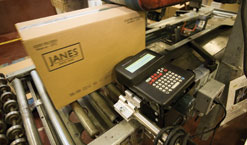
Product code information is applied by a Videojet Unicorn II case-coder and closed by a 3M-Matic case-sealer.
The relaunch involved extensive work on redesigning the boxes to move all the required product information in both English and French onto the front of the box and side-panels, explains Janes, in order to accommodate all the relevant MSC information on the back of the boxes.
“I really think our marketing department had done a brilliant job with the package redesign,” says Janes, specifically singling out the up-close, larger-than-life product photography helping the Janes brand make achieve outstanding shelf impact.
“We used the entire back-panel of the box to educate the consumer about the Marine Stewardship council and the role of Janes Family Foods in promoting marine sustainability,” points out Phillips, while also utilizing the 100-percent recycled-content GreenChoice 100 paperboard produced by the Toronto-based Stratchcona Paper LP and printed/converted by Boehmer Box LP in Kitchener, Ont.
Says Janes: “When we first launched our retail product all those years ago, we knew that packaging was the only way for us to get out our message to the consumers, since we didn’t have money for advertising, so we spent double the cost on the original product photography than what we could have done it for.
“But to this day, we continue to get lots of feedback from consumers about how much they love our packaging and how well it stands out on the store-shelves.
“And now that we have a real serious message to convey to these consumers about marine stewardship,” he concludes, “our packaging very much remains a core part of what our company is all about.”
Advertisement


